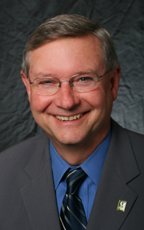You are on CGS' Legacy Site.
Thank you for visiting CGS! You are currently using CGS' legacy site, which is no longer supported. For up-to-date information, including publications purchasing and meeting information, please visit cgsnet.org.

Contact:
Belle Woods
bwoods@cgs.nche.edu
(202) 223-3791
The Council of Graduate Schools (CGS), in collaboration with the National Science Foundation (NSF), announces the appointment of the 2012-2013 CGS/NSF Dean-in-Residence, Richard W. Linton. Dr. Linton served as vice president for research and graduate studies and dean of the graduate school at the University of Oregon from 2000 to 2011; under his leadership the university’s research funding, interdisciplinary centers and institutes, commercial licensing of research, and associated statewide jobs and revenue grew dramatically.
"CGS is delighted to welcome Rich Linton as the new CGS/NSF Dean in Residence,” said Debra W. Stewart, president of the Council of Graduate Schools. “Rich has been a leader in the graduate education and research community and is ideally suited to this crucial position which offers a bridge between academia and NSF, a vital source of support for basic research,” she said.
The CGS/NSF Dean-in-Residence Program was created to provide a mechanism for ongoing and substantive communications between senior administrators at graduate institutions and the NSF, a major source of federal support for graduate fellowships and research projects. The program is an exceptional opportunity for an outstanding graduate dean to bring to the NSF insights, perspectives, and the practical experience of an accomplished administrator at a research university. In this role, Dr. Linton will help facilitate increased collaboration between NSF and stakeholders, fostering partnerships to address important issues in graduate education. Dr. Linton will spend approximately 80% of his time at NSF and 20% of his time at CGS during his seventeen-month appointment beginning March 1, 2012.
“NSF’s critical work with the graduate education community is made more effective by the CGS/NSF Dean in Residence program,” said James H. Lightbourne, Director of NSF’s Division of Graduate Education. He added, “Dr. Linton’s track record in developing interdisciplinary research initiatives and graduate programs, catalyzing inter-institutional collaborations and government-university-industry partnerships advancing science and technology, and in transferring discoveries from the university research lab to the marketplace will be important assets to NSF in the coming year.”
Dr. Linton was the inaugural chair of the Oregon University System Research Council and served on statewide economic development boards such as the Oregon Innovation Council, Oregon Cluster Network and the Oregon Engineering and Technology Industry Council. He began his service at the University of Oregon in 2000, having previously served as chief research and international programs officer for the University of North Carolina System and as a chemistry professor at UNC-Chapel Hill. He earned a bachelor's degree in chemistry in 1973 from the University of Delaware and a doctorate in chemistry in 1977 from the University of Illinois at Urbana-Champaign.
The Council of Graduate Schools (CGS) is an organization of over 500 institutions of higher education in the United States and Canada engaged in graduate education, research, and the preparation of candidates for advanced degrees. Among U.S. institutions, CGS members award 92% of the doctoral degrees and 77% of the master’s degrees.* The organization’s mission is to improve and advance graduate education, which it accomplishes through advocacy in the federal policy arena, research, and the development and dissemination of best practices.
* Based on data from the 2010 CGS/GRE Survey of Graduate Enrollment and Degrees




